MercoPress. South Atlantic News Agency
Latin America
-
Tuesday, April 16th 2024 - 10:26 UTC
Gradual improvement reported at Panama Canal

Things are looking up for the drought-stricken Panama Canal as new water levels allow an increase in the daily number of ships allowed through the man-made interoceanic corridor. Starting in June, 32 ships will be let through, it was announced Monday.
-
Monday, April 15th 2024 - 23:59 UTC
Chilean FM says conditions not met for free elections in Venezuela

The Chilean Government of President Gabriel Boric Font is adopting a neutral stance regarding Venezuela's political crisis by keeping active ties with the administration of President Nicolás Maduro as well as with disenfranchised opposition leader María Corina Machado. However, “there are no conditions for free elections in Venezuela,” Santiago's Foreign Minister Alberto van Klaveren told reporters during the weekend.
-
Monday, April 15th 2024 - 21:42 UTC
Haitian parties give thumbs down to Transitional Council

Haiti's political movements expressed their rejection during the weekend of last Friday's decree calling for the establishment of a Presidential Transitional Council published Government in the Official Gazette known as Le Moniteur. The mechanism had been devised to restore constitutional order in the Caribbean country where there has been no president since the July 7, 2021, murder of Jovenel Moïse in Port-au-Prince by a mercenary commando of mostly Colombian nationals.
-
Monday, April 15th 2024 - 10:22 UTC
US diplomat spying for Cuba given a 15-year prison sentence
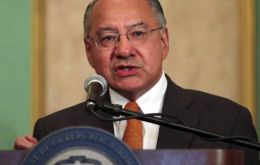
Colombian-born Victor Manuel Rocha, who served as a former US Ambassador to Bolivia from 2000 to 2002, has been sentenced to 15 years in prison for spying for Cuba for 40 years.
-
Monday, April 15th 2024 - 10:00 UTC
Brazil and Mexico looking ahead at significant economic growth
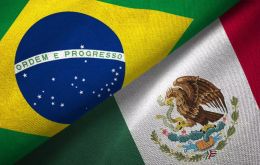
Only Brazil and Mexico would survive as world economic powers in Latin America by 2030, according to a study by PricewaterhouseCoopers (PwC) and Standard Chartered released last week. The two countries are expected to experience significant economic growth within the next six years.
-
Friday, April 12th 2024 - 22:20 UTC
Brazil accounts for nearly 70% of dengue cases in LatAm and Caribbean
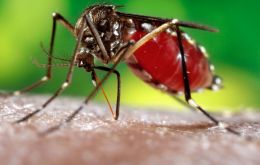
According to a survey conducted by the Pan American Health Organization (PAHO), Brazil accounted for almost 70% of dengue cases in Latin America and the Caribbean, where some 4.6 million infections were confirmed this year, representing a 237% interannual increase, Agencia Brasil reported. PAHO is the arm of the World Health Organization (WHO) in the Americas.
-
Friday, April 12th 2024 - 15:30 UTC
Latin America and Caribbean persistent low growth and stalled progress, World Bank report
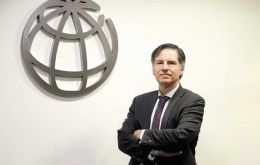
Latin America and the Caribbean (LAC) has reached a critical juncture. While the region has made significant progress in economic stabilization over recent decades, growth has stalled, undermining progress. Urgent action is needed to reverse course. In a new report, “Competition: The Missing Ingredient for Growth?” the World Bank highlights potential areas for action, emphasizing that leveraging competition policies and institutions is key to any impactful growth strategy.
-
Friday, April 12th 2024 - 09:50 UTC
Presidents Peña and Lacalle Pou fly together to Uruguay
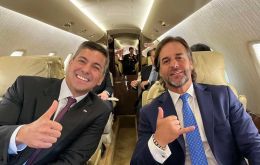
After attending a South American Football Confederation (Conmebol) event in Luque on Thursday, Presidents Luis Lacalle Pou and Santiago Peña flew to Uruguay for further engagements.
-
Thursday, April 11th 2024 - 19:44 UTC
Rotating supply cuts launched as Bogotá's water reservoirs are running dry

Authorities in the capital of Colombia began rationing water on Thursday as local reservoirs were reported to be nearing alarming levels due to the El Niño phenomenon coupled with the aftermaths of global warming. It has not been ruled out that the severe drought might result as well in an energy crisis hitting some 10 million people who live in Bogotá and the surrounding areas.
-
Thursday, April 11th 2024 - 10:04 UTC
Presidents Lacalle Pou and Peña attend Conmebol dinner in Asunción
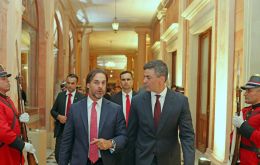
Presidents Santiago Peña of Paraguay and Luis Lacalle Pou of Uruguay Wednesday attended a dinner hosted by the South American Football Confederation (Conmebol) at the historic building of the Port of Asunción. Also participating in the event was Fédération Internationale de Football Association (FIFA) President Gianni Infantino.
